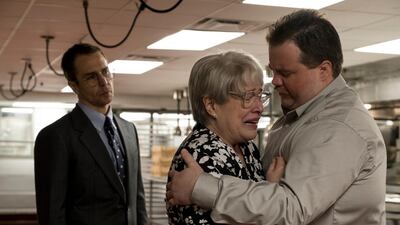In recent years, Clint Eastwood has focused his attention on telling the complex stories of several real-life American heroes, with mixed results. Bradley Cooper's Oscar-nominated portrayal of Chris Kyle, the deadliest marksman in US military history, and Tom Hanks's performance as Chesley Sullenberger, the pilot who safely landed a stricken plane on the Hudson River, meant both American Sniper and Sully received gentle plaudits. The 15:17 To Paris, meanwhile, in which Eastwood cast Spencer Stone, Anthony Sadler and Alek Skarlatos as themselves to show how they thwarted the 2015 Thalys train attack in France, was roundly and rightfully savaged by critics.
Far from just being a meticulous recreation of their actions, each of these films seek to pull back the curtain and explore how, why and what made these people act so courageously. Unfortunately, though, Eastwood's dedication to doing the individuals justice often comes at the cost of making the most compelling and entertaining movie. Sadly, Richard Jewell only continues this trend.
For those who haven't heard of Jewell and don't know about his plight, he shot to public consciousness on July 27, 1996, when, during the height of the Olympics in Atlanta, Georgia, a bomb exploded at the city's Centennial Park. The fact it only killed two people was the direct result of the intervention of Jewell, who was working as a security guard at a major event at the park. He found the bomb, alerted authorities, and helped the evacuation before it exploded.
Originally labelled a hero, Jewell was interviewed by many of the major news outlets in the country because of his efforts. However, just three days after the attack, the Atlanta Journal-Constitution printed that the FBI were treating Jewell as the main suspect, which led to a media witch-hunt that continued for weeks and ultimately wrecked his life.
Jewell was only fully exonerated when Eric Rudolph confessed to the bombing in 2005. That Jewell's innocence didn't garner anywhere near the same amount of attention as the accusation means his story undoubtedly deserves the cinematic treatment. Especially since Jewell died at the age of 44 in August 2007.
But while Richard Jewell starts off captivating before even becoming heartbreaking with its depiction of how he was wronged, the film ultimately falls flat because it doesn't have anything substantial beyond his plight. It's too simplified, and this lack of complexity and thematic resonance ultimately means that, while it is a little eye-opening, it actually verges on being forgettable. The reason Richard Jewell just about avoids this indignity is its performances. All of its leading ensemble shine, with Kathy Bates, Sam Rockwell and Paul Walter Hauser, who plays the titular role.
Hauser really stands out. The 33-year-old, who had previously shone in his supporting roles in I, Tonya and BlacKkKlansman, doesn't just appear in every scene and consistently deliver, but he manages to go toe-to-toe with Rockwell and Bates whenever they're on screen, too. Both of whom, lest we forget, are Academy Award winners. No wonder he was recently presented with the Breakthrough Performance award by the National Board of Review.
What makes Hauser's work even more impressive is the cinematic tightrope that he has to walk as Jewell. Not only does he showcase Jewell's grating personality and overzealousness to impress without ever getting annoying, but he goes from funny to vulnerable when required, and by the end, you're genuinely enamoured and warmed by the character.

Not to be outdone, though, both Rockwell and Bates have standout scenes that immediately elevate proceedings and briefly suggest Richard Jewell is about to become more dramatic and intense. Unfortunately, it doesn't, and as a result, it is never anything more than just enjoyable.
At times, Richard Jewell even borders on the aimless, as it appears to run out of ideas for how to tell the protagonist's story, and simply meanders from one scene to another without really enhancing or building upon the plot. Over the years, Eastwood's economic storytelling techniques and quick production turnaround have become the stuff of legend across Hollywood, with shooting on Richard Jewell only actually concluding in August, only three months before its world premiere.
This time around, though, Eastwood's approach only appears to have hindered the end result, and while he was able to eke out some incredible performances, his lack of directorial flair and the flimsiness of its finale ultimately means Richard Jewell doesn't make the impact it could and really should have made.

